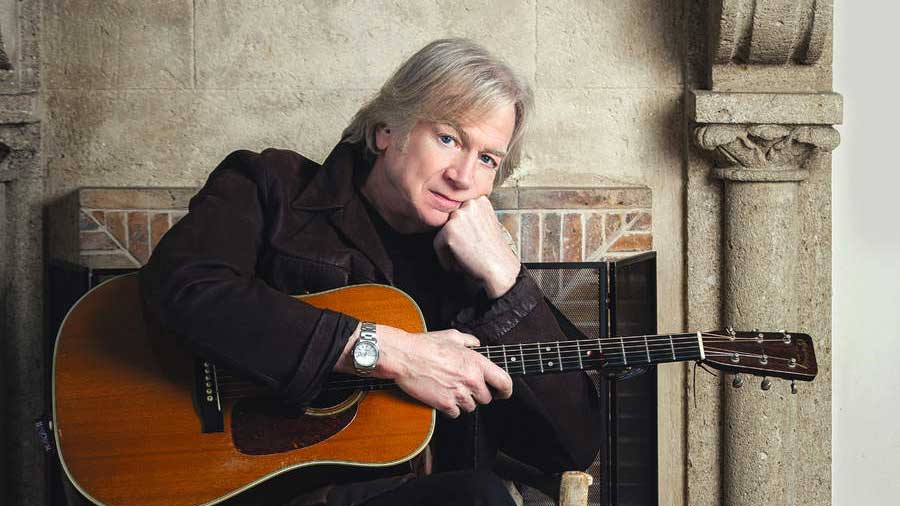It’s nearly 60 years since the teenage Justin Hayward became Marty Wilde’s guitarist, after which he established himself as singer, guitar player and focal point of the Moody Blues, writing enduring classics such as Nights In White Satin, Tuesday Afternoon, Question and The Voice.
The Moodies may be no more, but the evergreen Hayward’s solo career continues to flourish. Ahead of joining this year's On The Blue Cruise – which he'll be hosting – he tells Classic Rock about his musical passions.

The first music I remember hearing
I come from a family with quite strong faith, so I’d always go to church every Sunday. Most of it was boring, but I really liked singing from Hymns Ancient And Modern. To this day I can still go to church and have that same feeling. Then Johnnie Ray was the first pop singer that I liked: Cry and Just Walkin’ In The Rain.
The first song I performed live
I have an acetate of the first band that I was in, The Woodpeckers, during my first year at high school in Swindon. We played The Coasters’ Charlie Brown.
The guitar hero
During Van Halen’s Jump era, we were playing at the same big music festival in Bethlehem, Pennsylvania. I watched Eddie Van Halen and it was like: “How can you do that on a guitar? Where does that come from?” You can’t possibly learn that or teach what he did.
The singer
When the Moodies were inducted into the Rock And Roll Hall Of Fame [in 2018], Nina Simone was posthumously inducted with us. She meant a lot to the group in the early days. I was lucky enough to see her once. The emotion in her voice was just tremendous.
The songwriter
From Homeward Bound onwards, Paul Simon was somebody to aspire to. The way he put lyrical ideas together in such a simple way, with just an acoustic guitar. When I first saw Simon and Garfunkel at the Albert Hall in the late sixties, I’d assumed he was the lead voice, because he was the writer. But then I realised Art was singing lead and Paul did all those amazing little harmonies.
The cult hero
In the sixties there were lots of people who you thought were bound to make it, but it just didn’t happen for them somehow. [Guitarist] Roy Buchanan was very special. His playing just really turned me on.
The best album of all time
The Beatles were so important to me. I remember hearing Love Me Do for the first time and thinking life is going to be totally different from now on. When it came to A Hard Day’s Night, every song was a winner. I know they made it quickly, and the songs are only two-and-a-half minutes long, but that album always resonates with me. They opened the door for everyone.
My favourite live band
The best live band I ever saw was The Who at the Saville Theatre [London]. The sound was superb, especially the balance of guitars between John Entwistle’s bass and Pete’s SG. And of course it was so loud. There was nobody to beat them.
The best record I made
There’s two Moodies albums, actually: Days Of Future Passed [1967] and The Other Side Of Life [1986]. The second one put us back on top in America. To go around again in our career, like we did in the US during the eighties, was such a great gift. And I’d kind of missed it in the sixties, because my mind was elsewhere – chemically, mystically and emotionally.
The worst record I made
Before the Moodies, I did a couple of things on [label] Pye that weren’t the greatest thing. There’s also The Present [1983], where we’d take for ever to do one song. We’d gone into that kind of universe. It was a terrible temptation to just turn up, play football in the studio and make one song every few weeks.
My guilty pleasure
I love really beautifully crafted pop records – Stock Aitken Waterman, the Spice Girls and the boy bands. Should I be guilty about loving all of those things? I just love music.
My Saturday night / party song
If I’m sitting down and hear September by Earth Wind & Fire, I have to get up. It’s one of those records that, before you know it, you’re jigging around the room to. I always loved Maurice White’s voice and groove, and the band’s message of universal harmony.
My ‘in the mood for love’ song
I was privileged to know Danny Williams when I was playing with Marty Wilde. Danny did the English version of Moon River [1961], and those three minutes taught me how to sing – or at least how I wanted to sing. I’d recommend everyone listen to it.
The song that makes me cry
I wouldn’t say it makes me cry, but Christopher Cross’s Sailing always stops me in my tracks.
The song I want played at my funeral
There’s several recordings of Richard Strauss’s Four Last Songs. One is by Elisabeth Schwarzkopf, with the Berlin Symphony Orchestra [1966], and that gets me every time. The fourth song is called At Gloaming. It’s just so beautiful.

